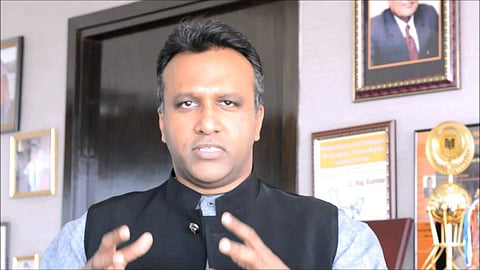

Dr C Raj Kumar, Vice-Chancellor, O P Jindal Global University (JGU) spoke during the Caspian Week at the 2019 World Economic Forum in Davos, Switzerland. He is the only Indian Vice-Chancellor who was invited to speak at this year’s WEF in Davos.
Professor Raj Kumar addressed the theme Philanthropy and Higher Education: The Indian Experience of Building a Knowledge Society through Universities. The speech addressed key issues in higher education, the impedance of research and knowledge creation, internationalisation and collaboration among universities and the challenges of building world-class universities in developing and emerging economies and potential lessons from the Indian experience.
The establishment of private universities in India, he said, has been highly recognised by national authorities and by global rankings agencies. Professor Kumar gave the example of JGU as a model for corporate philanthropy and institutional excellence for building private universities in developing countries.
He observed, “Among the developing countries, India and China have provided leadership in building world-class universities and institutions of global excellence. The future of higher education necessarily depends on the internationalisation of universities – public and private. In the era of robotics, mega-data, artificial intelligence and dynamic change, only universities of global standards will prosper, equipped with the ability to innovate and grasp the latest cutting edge knowledge and research. It is also important to recognise that universities need to be multidisciplinary with focus not only on STEM disciplines but also humanities, and social sciences.”
He exhorted the leaders representing government organisations, trade and industry sectors in Davos to focus on the growth and development of universities. He said, “We need to take our universities more seriously. Our universities need significant funding, resources and indeed better governance. This can only enable them to focus on imparting world-class education that will promote innovative pedagogy in teaching, rigorous research leading to outstanding publications by the faculty and internationalisation that will provide globally engaged opportunities to the faculty and students of the universities. The governments and businesses need to recognise the important role played by the universities for building a sustainable future and for the promotion of human development. They need to provide greater support to universities.”
Professor Kumar gave the example of O P Jindal Global University of how corporate philanthropy, coupled with notions of academic freedom and institutional autonomy, has helped India see the emergence of a new private, not-for-profit global university within a short span of time. It was notable that JGU, which is ten years old, led the emergence of a new generation of private and philanthropic universities in India. JGU was established by Mr Naveen Jindal in memory of his father, Shri O P Jindal.
Professor Kumar said, “We need more and more universities in the world which will be contributing to the development of a Knowledge society. Out of the 26000 universities in the world, Asia has nearly 13000 universities, and the BRICS is home to 9000 universities. However; the challenge is how to build universities with a focus on excellence through recruitment of outstanding faculty, international engagement, and cutting edge research.”
